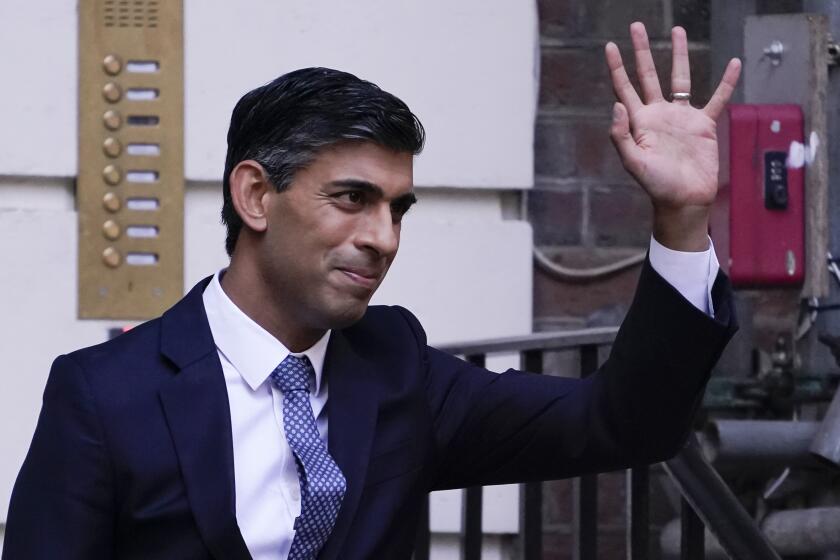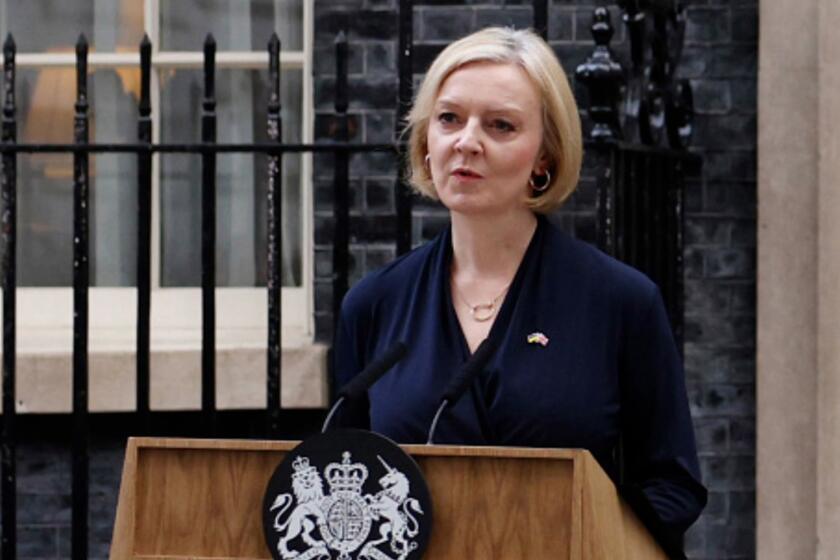Op-Ed: Liz Truss’ downfall won’t end trickle-down economics

- Share via
With former British Prime Minister Liz Truss’ free-market reforms having severely wounded the British economy, a chorus of pundits have claimed that the end of free-market thought is upon us. Who could at this point be so foolhardy as to claim that simply cutting taxes for the rich — and not doing much else — would make us all rich?
Well, don’t think for a minute that this British debacle will put an end to free-market thought. This latest form of supply-side trickle-down economics is, after all, rooted in a belief system that goes back thousands of years. Even though it has failed over and over again, people and governments keep coming back to the dream that markets can simply run themselves.
Adam Smith, considered by many as the founder of free-market thought, is a good guide for understanding just how powerful this philosophy is. Smith was an heir to the moral philosophy of the Roman senator Cicero. Like Cicero, Smith thought that if like-minded upper-class men tended their farms and traded in friendship and not simply for profit, they could count on nature to create a perpetual system of wealth. It seemed a plausible idea. The Roman Republic was more than 500 years old, and its senatorial oligarchy had enjoyed constant riches and status since time immemorial.
Britain’s youngest prime minister in more than 200 years must grapple with high inflation, a cost-of-living crisis and chaos within his ruling party.
Smith mixed faith in the ancient cult of free-market farming with a new scientific optimism. Inspired by Newton’s scientific vision of universal laws of movement, Smith looked for a science-based social and economic recipe to codify Cicero’s belief in an eternal natural order of wealth production. For Smith, the magic formula involved a governing class of virtuous landowners who would balance out the natural avarice of merchants, creating an “invisible hand” by which the market would be set to produce wealth on its own.
Between 1774 and 1776, at the very time Smith was writing “The Wealth of Nations,” France eliminated subsidies, monopolies and price controls on grain in the hope that full free trade and freedom for landowners would spark market growth. Instead, the market crashed, as hoarding and price gouging caused shortages, famine and uprising. Smith published his treatise, which advocated for the very reforms that failed spectacularly in France, around the time King Louis XVI reversed course.
The failure of free-market-based reforms has never put a lasting dent in laissez faire economics in leading industrial democracies. In 19th century Britain, free-market thinkers believed that if the state removed itself from economic affairs, the country would prosper, even as labor unrest and social inequality eventually led to regulations on factory conditions, child labor, wages and worker welfare.
In 1905, economic historian William Cunningham wrote that free-market thought was a bankrupt ideology. He complained that it was a “strict rule from which there was no departure,” and was a “subterfuge” under which greed and “indifference cloaked themselves.” Free marketeers were gutting the British economy and driving the country to war with its neighbors, he warned. He believed that following the principles of free trade could prove “fatal” for Britain. However powerful Cunningham’s critique was, it did not stop free-market thinking.
Right-wing commentators praised Liz Truss’s economic strategy to the skies. But it was a dismal failure, and now she’s gone. American politicians, take note.
This perpetual loop of free-market boosterism, crash and correction was repeated in 20th century America and Britain. When the Great Depression hit in 1929, President Hoover followed the advice of Andrew Mellon, then Secretary of the Treasury, and let the Depression “liquidate” the American economy. Free-trade advocates, such as the economists Joseph Schumpeter and Friedrich Hayek, both believed that the Depression was “creative destruction” that would produce good. For them, the only thing a state should do was let supply and demand work their economic magic. But even Hoover was later forced to recognize that his free-market policies were grievously destroying the nation’s economic capacity.
One would have thought that the Depression and Franklin Delano Roosevelt’s ensuing economic success would have slayed free-market thought once and for all, but the hope that “the cure” of an economic disaster would “mobilize” the productive elements of the economy, as Hayek put it, bounced back strong as ever.
What accounts for the free-market dream’s persistence in the face of serial failure? Free-market thought is simply too engrained in the philosophical and political makeup of Western democracies to disappear. Free markets produce wealth, and free markets (along with help from the state) are certainly preferable to the alternative of planned or centralized economies.
Yet if history teaches us anything, it is that the dream of establishing self-governing and self-perpetuating economic order — whether set in motion by Cicero’s nature, Newton’s mechanics or economists’ formulae of general equilibrium of supply and demand — is a illusion. But it is a powerful one.
We have to constantly remind ourselves that free markets work well only when they are supported by social democracy, state industrial strategy (think of all the government incentives that directly or indirectly support Tesla) and a serious investment in infrastructure, education and research, as well as by responsible budget management.
When the free marketeers return with their promises of trickle-down economics — and they will — we will have to make the case, again, that the markets cannot just be left to run on their own.
Jacob Soll is University Professor and a professor of philosophy, history and accounting at USC Dornsife and the author, most recently, of “Free Market: The History of an Idea.”
More to Read
A cure for the common opinion
Get thought-provoking perspectives with our weekly newsletter.
You may occasionally receive promotional content from the Los Angeles Times.












